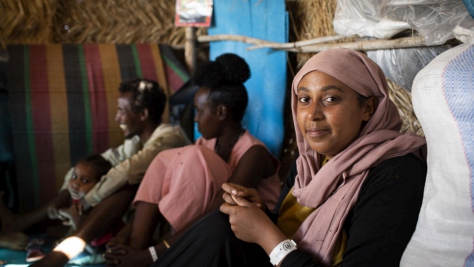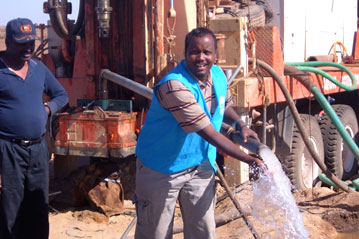UNHCR optimistic about meeting water needs of refugees in Ethiopia
UNHCR has always faced difficulties ensuring that refugees in eastern Ethiopia have enough water, but is optimistic that new projects will solve the problem.
ADDIS ABABA, Ethiopia, April 2 (UNHCR) - Over the past two decades, UNHCR has helped more than 600,000 Somali refugees in the eastern lowlands of Ethiopia. Providing them with enough water has always been a problem, with the UN refugee agency facing funding shortfalls, meagre and difficult to access underground reserves, and competition from locals for the scarce resource.
That's as true today as it was in 1991, when Somalia started disintegrating after the fall of the Siad Barre regime and people began fleeing. Most of the refugees eventually returned home, with just 16,000 remaining in Kebribeyah camp. But renewed conflict in Somalia has led to fresh influxes, prompting UNHCR to open the Aw Barre and Shedder camps in 2007 and 2008 respectively.
Under UNHCR's emergency guidelines, a person needs at least seven litres a day to survive and 20 litres a day to ensure their well-being and good health. Currently, that minimum standard of 20 litres is not being met in any of the three camps, but UNHCR believes that projects now under way should ensure that this target is reached and that access to water outlets is improved.
To meet the needs of Kebribeyah, the former Hartisheik camp and local communities, UNHCR in 2004 opened a pipeline to transport water from the well watered Jarar Valley, some 20 kilometres away.
But, as UNHCR Representative in Ethiopia Moses Okello noted, "Even this huge project does not guarantee an adequate supply of water to every family in the camp. Technical problems, and the high cost of managing the system, mean occasional failure to meet the minimum daily standard of water."
To resolve this problem, the UN refugee agency and the Ethiopian Electric Power Corporation have been working to connect the Jara Valley water supply system to the national electricity grid, which will make it cheaper to power the system than using fuel-guzzling generators. Okello believes this will solve many of the problems related to running the facility.
Meanwhile, to meet daily needs in the Aw Barre and Shedder camps, UNHCR had to truck large quantities of water from a nearby town, drill boreholes and construct a distribution network to ensure that refugees did not have to go far to get access to water.
Okello said that thanks to special funds made available for water and sanitation projects by UN High Commissioner for Refugees António Guterres, "We have been drilling and interconnecting half a dozen boreholes in the two camps. So far we have managed to provide a daily average of 12 litres per person in the two camps."
It is a work in progress. But Okello said he was optimistic that the minimum standard per person of 20 litres a day would be achieved in all three camps once the various water projects had been completed.
Somali refugee Rahma Mohammed Jamale, who fled to Ethiopia to escape conflict in Mogadishu, was one of the first residents of Shedder camp when it opened in May last year. She said it was initially tough finding enough water for herself and her six children.
"We had only two water points for a whole zone and that meant queuing up for hours to get a jerry can of water," she said, adding that the situation was much better but more work was still needed to increase the water supply for the camp's 6,600 refugees and Ethiopians living nearby.
Jamale said the improved water situation meant that children in the camp were spending more time in school and less time lining up for water. "But for this positive development to be sustained, it is up to us refugees to guard the system against misuse," she added.
By Kisut Gebre Egziabher in Addis Ababa, Ethiopia
Related news and stories
Thousands of newly arrived Somali refugees in Ethiopia relocated to new settlement
Samira's Story
Drought brings life-threatening food shortages for refugees in Ethiopia
100,000 new Somali refugees arrive in Ethiopia in the past month, UN and partners are calling for urgent funding
UNHCR teams and partners rush assistance to some 100,000 newly arrived Somali refugees in hard-to-reach area of Ethiopia
As the Horn of Africa drought enters a sixth failed rainy season, UNHCR calls for urgent assistance
-

15by30 Roadmap - Coming together to achieve 15% enrolment by 2030 (visualized PDF)
23 Mar 2021 This PDF provides a visual summary of the 15by30 roadmap. It highlights where the strategy stems from, what the overall targets are and which actions need to be taken to achieve the goal to increase enrolment in higher education of young refugee women and men to 15% by 2030. -

Tertiary Education 15by30 roadmap - actions across the pathway (visualized PDF)
23 Mar 2021 Five key pathways facilitate access to higher education: national universities, the DAFI scholarship programme, technical and vocational education and training, connected higher education and complementary education pathways for admission to third countries. This PDF visualizes the key actions across each of these pathways – from strengthening partnerships to improving accessibility. -

Tertiary Education 15by30 Roadmap Agenda - Working Across the Five Pathways of Higher Education (visualized PDF)
23 Mar 2021 This PDF visualizes the different working steps that are part of the 15by30 roadmap agenda for higher education. -

UNHCR outraged by deadly attack against displaced population in Western Niger
23 Mar 2021 -

Uprooted in their own land: the internal displacement crisis
23 Mar 2021 With 45.9 million people displaced inside their own countries, a new data visualization reveals the scale of the issue, the latest trends and prospects for lasting solutions. -
Remarks to the 80th Session of the Standing Committee of the Executive Committee of the High Commissioner's Programme
23 Mar 2021 -

Bangladeshi authorities, aid agencies and refugee volunteers rush to respond as massive fire leaves some 45,000 Rohingya refugees without shelter
23 Mar 2021 -

Bain & Company
Bain & Company provides invaluable pro bono support to UNHCR on a range of strategic and organizational topics. It has advised UNHCR on the design and set-up of change management and business transformation capabilities. -

Better access to water improves lives for refugees and their hosts in Zimbabwe camp
22 Mar 2021 UNHCR, the UN Refugee Agency, and partners have improved water supply at Tongogara camp, in a project funded by the African Development Bank.

